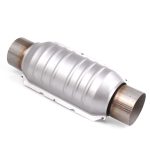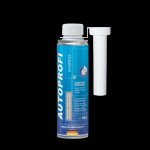Maximize Fuel Efficiency: Unraveling The Impact Of A Faulty Catalytic Converter On Gas Mileage!
Can a Bad Catalytic Converter Cause Bad Gas Mileage?
Introduction
Hello, Converter user! Are you experiencing a decrease in your vehicle’s fuel efficiency? If so, you might be wondering if a bad catalytic converter is to blame. In this article, we will explore the relationship between a faulty catalytic converter and poor gas mileage. Understanding the impact of a bad converter on fuel efficiency can help you diagnose and address the issue, ultimately saving you money at the pump.
1 Picture Gallery: Maximize Fuel Efficiency: Unraveling The Impact Of A Faulty Catalytic Converter On Gas Mileage!
Before we delve into the details, let’s first understand what a catalytic converter is. A catalytic converter is an essential component of the exhaust system in modern vehicles. Its primary function is to convert harmful gases, such as carbon monoxide, nitrogen oxides, and hydrocarbons, into less harmful substances before they are released into the atmosphere.
Now, let’s explore how a bad catalytic converter can affect your gas mileage.
What is a Bad Catalytic Converter?

Image Source: valleychevy.com
🔍 A bad catalytic converter refers to a converter that is no longer functioning optimally. It may be partially or completely clogged, damaged, or malfunctioning. When a converter is bad, it fails to efficiently convert harmful gases, leading to a range of issues, including decreased gas mileage.
🔍 A clogged or damaged converter restricts the flow of exhaust gases, causing reduced engine performance and efficiency. The engine has to work harder to push the exhaust gases through the converter, resulting in increased fuel consumption.
🔍 Additionally, a faulty converter may not be able to effectively carry out the chemical reactions required for the conversion process. This can lead to the accumulation of unconverted gases, further contributing to poor gas mileage.
Who is Affected by a Bad Catalytic Converter?
🔍 Anyone who owns a vehicle with a catalytic converter can be affected by its deterioration. However, certain factors can increase the likelihood of experiencing a bad catalytic converter and its associated effects on gas mileage.
🔍 Older vehicles are more prone to catalytic converter problems due to wear and tear over time. Additionally, vehicles that are driven in harsh conditions, such as those subjected to frequent stop-and-go traffic or off-road driving, are at a higher risk of converter damage.
🔍 It’s important to note that a bad catalytic converter can affect both gasoline-powered and diesel-powered vehicles. The impact may vary depending on the specific engine and emission control system.
When Does a Bad Catalytic Converter Cause Bad Gas Mileage?
🔍 A bad catalytic converter can cause bad gas mileage at any time once it starts to deteriorate. However, the extent of the decrease in fuel efficiency may vary depending on the severity of the converter’s condition and the vehicle’s overall health.
🔍 In some cases, a minor issue with the catalytic converter, such as a partial blockage, may result in a slight decrease in gas mileage. On the other hand, a severely clogged or damaged converter can cause a significant drop in fuel efficiency.
🔍 It’s worth noting that a bad catalytic converter is not the only possible cause of poor gas mileage. Other factors, such as improper tire inflation, engine problems, or driving habits, can also contribute to decreased fuel efficiency.
Where Can a Bad Catalytic Converter Cause Bad Gas Mileage?
🔍 A bad catalytic converter can cause bad gas mileage in any location where you drive your vehicle. The impact is not specific to a particular geographical area.
🔍 However, certain driving conditions, such as heavy traffic or constant stop-and-go driving, can exacerbate the effects of a faulty converter on fuel efficiency. These conditions often require the engine to work harder, putting additional strain on the converter.
🔍 Whether you’re driving in the city or on the highway, a bad catalytic converter can lead to decreased gas mileage.
Why Does a Bad Catalytic Converter Cause Bad Gas Mileage?
🔍 The primary reason a bad catalytic converter causes bad gas mileage is due to its impact on the engine’s performance and efficiency.
🔍 As mentioned earlier, a clogged or damaged converter restricts the flow of exhaust gases, resulting in increased fuel consumption. The engine has to exert more effort to push the gases through the converter, leading to decreased gas mileage.
🔍 Additionally, a faulty converter may not be able to efficiently convert harmful gases into less harmful substances. This can lead to the accumulation of unconverted gases, which further reduces fuel efficiency.
How Does a Bad Catalytic Converter Cause Bad Gas Mileage?
🔍 A bad catalytic converter affects gas mileage by interfering with the proper functioning of the engine and the overall emission control system.
🔍 When a converter is clogged or damaged, it disrupts the flow of exhaust gases, causing the engine to work harder. This increased workload results in higher fuel consumption and, consequently, poor gas mileage.
🔍 Additionally, a faulty converter may trigger the check engine light, indicating a problem in the vehicle’s emission control system. This can lead to reduced engine performance and fuel efficiency.
Advantages and Disadvantages of a Bad Catalytic Converter
👍 Advantages:
1. There are no direct advantages of having a bad catalytic converter as it negatively impacts your vehicle’s fuel efficiency and emissions.
👎 Disadvantages:
1. Decreased gas mileage: A bad catalytic converter can significantly decrease your vehicle’s fuel efficiency, leading to frequent visits to the gas station and higher fuel costs.
2. Increased emissions: A faulty converter may not be able to effectively convert harmful gases, resulting in higher emissions. This can contribute to air pollution and environmental damage.
3. Potential engine damage: In some cases, a severely clogged or damaged converter can cause engine misfires or overheating, leading to costly repairs.
4. Reduced performance: A bad catalytic converter can impact your vehicle’s overall performance, including acceleration and power output.
5. Failed emissions test: A malfunctioning converter can cause your vehicle to fail emissions tests, leading to potential fines or registration issues.
Frequently Asked Questions (FAQs)
1. Can a bad catalytic converter cause my engine to misfire?
🔍 Yes, a bad catalytic converter can potentially cause engine misfires. A clogged converter can restrict the flow of exhaust gases, leading to incomplete combustion and engine misfires.
2. How much does it cost to replace a bad catalytic converter?
🔍 The cost of replacing a bad catalytic converter can vary depending on the make and model of your vehicle, as well as your location. On average, the replacement cost can range from $500 to $2,500, including parts and labor.
3. Can I drive with a bad catalytic converter?
🔍 It is not recommended to drive with a bad catalytic converter for an extended period. A faulty converter can impact your vehicle’s performance, fuel efficiency, and emissions. It’s best to have it inspected and repaired by a qualified mechanic.
4. How can I prevent a catalytic converter from going bad?
🔍 While you can’t prevent a catalytic converter from eventually wearing out, there are steps you can take to prolong its lifespan. Regular maintenance, such as keeping up with oil changes, using high-quality fuel, and addressing any engine issues promptly, can help prevent premature converter failure.
5. Can a bad catalytic converter affect the performance of my vehicle?
🔍 Yes, a bad catalytic converter can negatively impact your vehicle’s performance. It can cause decreased acceleration, reduced power output, and overall engine inefficiency.
Conclusion
In conclusion, a bad catalytic converter can indeed cause bad gas mileage. When a converter is clogged, damaged, or malfunctioning, it restricts the flow of exhaust gases, leading to decreased engine efficiency and increased fuel consumption. It’s important to address any issues with your catalytic converter promptly to avoid further damage to your vehicle and to ensure optimal fuel efficiency. If you suspect a problem with your converter, consult a trusted mechanic to diagnose and repair the issue.
Final Remarks
Disclaimer: The information provided in this article is for educational purposes only and should not be considered as professional advice. Always consult a qualified mechanic or automotive expert for accurate diagnosis and repair of any vehicle-related issues.
This post topic: Converter



